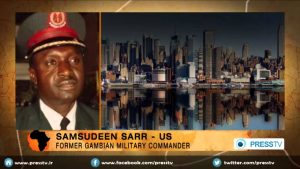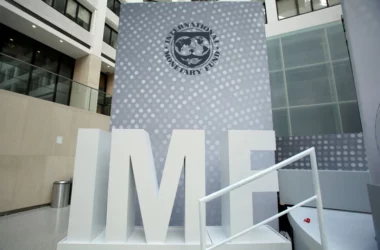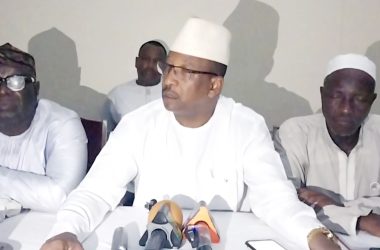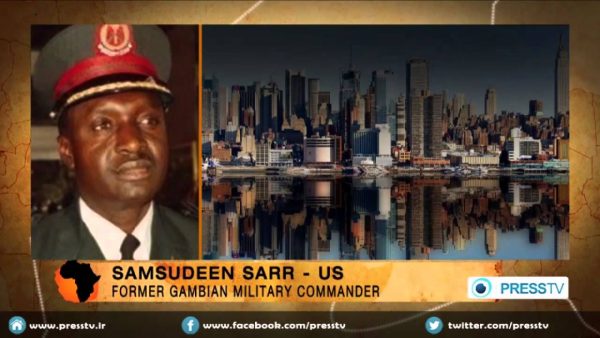 I concluded my last paper, on this series of chronicling my experience of The Gambia’s July 22nd 1994 military takeover, at the offices of the Vice President and Minister of Defence of the Republic of The Gambia. At where the five important American visitors paying a courtesy call to the office of the Vice President were finally seated by their host.
I concluded my last paper, on this series of chronicling my experience of The Gambia’s July 22nd 1994 military takeover, at the offices of the Vice President and Minister of Defence of the Republic of The Gambia. At where the five important American visitors paying a courtesy call to the office of the Vice President were finally seated by their host.
I then immediately took to my heels through the stairs from the upper to the lower ground floors of the office complex to meet the ADC who barely fifteen minutes earlier informed me the crazy story of the on-going coup d’etat from Yundum Army Barracks.
But once again, the need to clarify important matters misrepresented or overlooked in part three deserve revisiting before going into the details of this segment.
I mentioned Mengistu Haile Mariam in the last article as being one time Somalia’s head of state instead of Ethiopia’s. The Pro-Soviet Union military officer at the time ruled Ethiopia from 1977 to 1991.
But what I thought needed to be rectified most was the incorrect evidence presented to the TRRC by some of the witnesses from the security forces that the British Army Training Team (BATT) departed the Country before the Nigerian Army Training & Assistance Group (NATAG) took over the GNA. And, the misrepresentation of the fact that BATT was better than NATAG.
I don’t know how they forgot about the last nutty BATT Commander, Colonel Jim Shaw who succeeded Colonel Gilbert in 1990 and left in 1993.
There is no doubt that the BATT who started the recruitment and general training of the GNA from infancy in 1984 did a tremendous work in moulding the army with the basic tactical and technical skills necessary for the size and purpose of which the force was created.
With the initial objective of building a battalion-size infantry unit, the BATT offered the GNA soldiers and officers, basic military training in handling personal weapons, the AK 47 assault rifle, marksmanship, field craft, map reading or land navigation, battle drills, foot drills, guard duties, ceremonial duties and the like but at their most elementary standards.
From the first platoon to the first battalion realized around 1989 the British maintained a firm control of every army activity, telling us what to do, how, when and why. There were no reference materials or books to guide our actions or determine the terms and conditions of our services.
They prepared our training programmes, implemented and supervised them in the way directed by the BATT commander through his NCOs. We couldn’t go to the shooting range with our rifles or fire a single round, blank or live, without the supervision and/or approval of BATT officer(s).
The only place GNA officers and soldiers enjoyed some taste of autonomy without the apprehensive feeling of a BATT “master” hovering over their shoulders for scrutiny was at the Confederation Army. And like I always say, serving in the Confederation Army with its autonomy and lucrative benefits stood out to be the best morale booster in a GNA soldier’s career.
Then unfortunately, the confederation unexpectedly ended leaving the army lost in a confused struggle to redefine the meaning and purpose of its existence.
So, in those troubling times, while trying to adjust to the uncertainty caused by the disintegrated confederation, the British government sent us Colonel Jim Shaw as the new BATT commander.
My first strange encounter with the colonel happened when, not too long after his arrival, I incidentally asked him about an operation conducted by the GNA at Yundum Airport which I knew was the responsibility of the police, not knowing that it was his initiative. Instead of answering my question in the simple manner I expected, the Colonel went ballistics, screaming in my face with all veins protruding over his neck for what he said was beyond my rank to question a “command decision”. I was a full lieutenant a relatively higher rank at the time.I couldn’t believe that I was dealing with a stable individual.
He had ordered a whole company to go into the airport in search of more weapons after an old rusty AK47 was found by a villager at his farm in the area and surrendered it to the army. One view of that weapon showed that it was lost during the hot battle between Kukoi’s fighters and the Senegalese paratroopers deployed to capture the airport in 1981. The Colonel just didn’t want to factor that possibility but insisted on searching the airport.
Ironically, a query soon came from Banjul to Yundum Barracks asking for the reason why the army was at the airport that was raising unnecessary anxiety among the civilian population in the area. The message from the Defence Ministry ordered the Army Commander to withdraw the troops forthwith with a warning not to ever repeat it without consulting the ministry first.
However, with a little bit of investigation, I eventually learnt that Colonel Jim Shaw was in the 70’s actively involved in the Rhodesian Bush War also known as the Zimbabwe War of Independence. He had fought for the Rhodesian Colonial Army against the Zimbabwe African National Army and without doubt exhibited clinical symptoms of a soldier suffering from Post Traumatic Syndrome Disorder (PTSD).
It is the kind of madness that is not caused by aimless evil spirits waiting in single cell rooms in prison facilities waiting for innocent detainees to possess their souls – if you know what I am alluding to – but the mental illness suffered from the horrors of war that is today responsible for the daily death on suicide of 22 U.S Marines caused by their war experiences in Iraq and Afghanistan.
Knowing that there was nobody to stop Jim Shaw in The Gambia while being entrusted with the special role of being the de-facto national security adviser of the country, I decided to resign from the army as provided in the General Orders of the Gambia Civil Service for commissioned officers. After discussing it with my family I tendered my resignation letter on health reasons.
Two years before, on May 4, 1988, while servicing my hand gun at my military post at Kartung Village, I accidentally pulled the trigger of the loaded weapon and shot myself on my thigh sustaining multiple fractures on my bone. I was flown to Dakar, Senegal as a confederation army officer where I was treated for three months but had residual brass chips deeply imbedded in my bone, still visible by x-ray. I thought that was enough medical reasons to resign from my position as an infantry officer.
While waiting for the date to leave, another officer the Late Lt. Momodou Camara (RIP) also tendered his resignation with a similar perception of an army with little hope for future progress.
To my surprise the commander accepted Lt. Camara’s resignation and denied mine on the baseless pretext that after the government had spent so much money on training me I couldn’t just quit like that without paying the money back as if Lt. Camara who was trained at Sandhurst Military Academy in England was not governed by the same rules and written nowhere. I knew that the idea was from Colonel Jim Shaw. We avoided each other since I wrote to him about his tirade telling him how I was disappointed with his reaction unexpected of a BATT Commander and far different from that of his predecessors’. He apologised later but we never got along since.
I insisted on leaving and was before long charged with vague offenses, put to a court martial and demoted from the rank of lieutenant to second lieutenant.
Anyway for the Gambians to finally know, it was Colonel Jim Shaw who advised the PPP government to send GNA troops to Liberia – ECOMOG 1990 – when the readiness of the young army to be on its own for the first in a combat situation was questionable. It was Jim Shaw’s recommendation to disallow the corpse of the GNA soldiers killed in Liberia to be brought back home for burial.
Then in 1992 the soldiers returned from Liberia and couldn’t get their meagre allowances of $3.00 a day unpaid by the government for two months, compelling them to seek audience with the GNA commander for help.
They peacefully assembled at the Yundum Barracks hall behind the guard room and asked to talk to the commander about their payment problem and to find out when the government had intended to pay the money.
While waiting in the hall Colonel Shaw, selected Captain Mamat Cham (adjutant), Sergeant Major Sellors (BATT), Cadet Officer Edward Singhateh (Cadet Officer under training), armed them with loaded Kalasnikov rifles and tried to intimidate the soldiers. He threatened to arrest all of them, roughly over forty soldiers, for what he called their mutinous behaviours.
Mamat Cham and Edward Singhateh took position outside one entrance to the hall while Shaw and Sellors blocked the main exit door. Then to the shock of everyone Colonel Shaw started firing shots in the air and ordering the soldiers in his usual style of tirade to remain where they were and consider themselves under arrest.
It triggered spontaneous stampede of the soldiers to get out of the hall almost overrunning the Colonel with his gun while some rushed to the guard room to seize weapons from the soldiers on sentry duties. Those on sentry duties denied them the guns while the few caught by surprise emptied their bullets in the air before handing over the empty weapons to the angry soldiers. It was a disaster narrowly averted, thanks to an unstable BATT officer who was free to do whatever stupid thing he wanted even if it meant compromising our national security.
Desperate to arm themselves but couldn’t, the soldiers dashed out of the barracks to the Brikama /Yundum Highway with two or three of them carrying unloaded weapons. They commandeered private vehicles and drove straight to Banjul to seek audience with the head of state. Colonel Shaw and his team followed them to Banjul still trying to get them arrested.
The president upon hearing the crisis invited the soldiers to the State House and attended to their needs. The Army Commander shouldered the blame and accepted the request from the president to resign as one of the conditions demanded by the soldiers.
That very month, the president sought military assistance from his friend and colleague the Nigerian head of state General Ibrahim Babaginda. The GNA commander was replaced by an acting commander but with Jim Shaw still pulling the strings in every affair of the army.
Barely a year later the second batch of soldiers from Liberia came back home. They also waited for two months without their allowances paid. This time around they organized their protest march better prepared. They secured enough weapons and ammunition from the guards the night before and by 8:00 am the next day the camp woke up to the echoes of gun shots fired all over in the air. They didn’t assemble or wait to talk to the commander either. They just commandeered vehicles from the Highway and drove towards Banjul.
On their way however, the Tactical Support Group (TSG) of the police under the command of Lt. Yahya Jammeh occupied the Denton Bridge and prevented them from crossing over to Banjul. Lt. Jammeh had not yet transferred to the GNA, a move he took after the arrival of the Nigerians. Will discuss that later.
Colonel Jim Shaw ensured that all the soldiers were arrested and locked up at Mile Two Central Prison charged with treasonable offenses. NATAG could no longer wait. They arrived without delay and changed the conditions in the camp, scrapping the prosecution of the “mutinous” soldiers, reintegrating them into the army, cutting down the number of GNA troop sent to Liberia and starting the reorientation of the army into a more mature and realistic organization.
The Nigerians did not only reorganize the GNA to reflect the form and substance of an ideal army having the necessary conventional organs and structures with guidelines to maintain them even after their departure, but went further to equip the infantry battalion with better and more sophisticated weapons and taught the soldiers how to effectively apply them in combat.
For the first time the GNA understood how to properly utilize heavy tactical weapons including but not limited to the 60 mm mortars used by “B” Company under the command of 2 Lt. Sana Sabally and 2 Lt Sadibou Hydara (RIP) to capture the main TSG Barracks at Fajara in less than an hour after attacking the camp on July 22 1994; invariably, Lt. Yahya Jammeh & 2 Lt. Edward Singhateh after seizing “C’ Company from the Company Commander armed their men with arsenals like Rocket Propelled Grenades (RPGs), Anti-aircraft machine guns and grenade launchers giving them the unstoppable edge to move from Yundum to Banjul and seize the seat of government in less than six hours. Nothing except perhaps the intervention of the US Mechanized Marine Platoon that arrived with USS Lamour County could have stopped the GNA that day.
In short, the NATAG transformed the GNA from an army with basic equipment and basic training into an army with advance equipment and advance training, crafting it into a formidable combat-efficient force.
With Nigerians treating the BATT’s presence as no longer relevant in the army or country, Colonel Jim Shaw and his team opted to leave and were promptly withdrawn by the British government in 1993. It was good riddance.
Nonetheless, on a fair assessment of the overall situation I must admit that the BATT were very good in building an army for The Gambia, but the NATAG perfected it into its ultimate maturity and proficiency.
Hence when the ADC to The Gambia Head of State informed me on that Friday morning of July 22nd 1994 that the GNA was on the move from Yundum Barracks fully armed with the weapons in stock in the armoury, I knew that the country was in serious trouble.
The captain was right there not far from where I left him when I came out of the building from the Vice President’s office. We briefly discussed the best and next line of action under the circumstances.
The State Guard at the State House, estimated to be a company size with relatively very light weapons, was more of a ceremonial – service unit, very beautiful on parade grounds, excellent in performing guard of honours, enviable for permanently traveling and protecting the president in suits and ties but not adequately insulated to handle the wrath of the GNA.
We agreed that I should go to the Gambia Marine Unit Base beside the Banjul Port to explore the possibility of using their heavy weapons mounted on their patrol boats as matching weapons to the big guns at Yundum Barracks. I was also aware of the three 50 calibre machine guns brought along by the Americans as gifts for the Gambia Marine Unit to be mounted on the newly built patrol boat “Bolong Kanta” to be delivered that morning. 50 Calibre machine guns are built with the capability of destroying Armoured Personnel Carriers (APS) and carry ammunition that could pierce through 6 inches thick of homogenous steel. Gambian officers trained in the USA are all taught how to disassemble, assemble and accurately fire them from different positions in the field.
Through Wellington Street I drove to the Marine Unit and found the Commander in his office. He was already aware of the crisis at the Yundum Military Barracks. I told him what I was there for but found out that the weapons on the patrol boats were built together with the vessels by the manufacturers and could not be dismounted or remodelled for ground warfare.
The three 50 calibre machine guns brought along in the USS Lamour County were still in the vessel and not delivered for use. We couldn’t even tell whether they came with their ammunitions. Nothing therefore was feasible in my odyssey to alter the variables with better weapons.
I decided that staying in Banjul, an island, until an armed conflict of the magnitude in my imagination erupted was not a wise idea.
“I am going to Yundum Barrack”, I told the marine commander and started my car towards that destination. I took the same way, Bond Road, like in the morning when coming from my house to the Banjul Port. It was around 10:00am going to 11:00am.
At above 80 miles per hour I drove on the highway alone with no vehicle before or after me. With the highway that empty at that time of the day, just after rush hour, it was clear to me that there was trouble ahead.
Just before reaching Denton Bridge, I saw TSG soldiers armed with AK 47 rifles spread along the entry point. I stopped the car off the road, got out and ran towards them.
There he was, the Deputy Inspector General (DIG) of Police in field uniform carrying a pistol while few of his men in prone position aimed their weapons towards the Kombo direction of the Bridge as if ready to shoot at anything that popped up in the horizon.
I asked the DIG what was going on and he exploded with frustration telling me how they were sick and tired of the GNA soldiers always causing unnecessary problems in the country. But this time around they will not allow them to get away with their nonsense. That the Bridge was closed and anybody daring to cross it will be stopped by all means necessary.
I tried to reason with him by first…
To be continued!
By Samsuden Sarr












